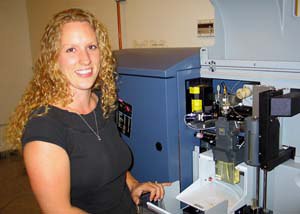

When Dean of Natural Sciences Maria Pallavicini applied as a co-investigator on a UC Davis proposal to the California Institute of Regenerative Medicine, or CIRM - the state board which awards funds from the November 2004 measure that appropriated monies for stem cell research in California - she was hoping for an outcome something like this.
The grant allows graduate students and postdoctoral researchers at participating institutions to receive training fellowships, and UC Merced graduate student Basha Stankovich, was chosen as a fellow. Advised by Pallavicini along with new professor Marcos Garcia-Ojeda, Stankovich now has new resources to further her research on the early stages of how embryonic stem cells become blood marrow, or hematopoetic, stem cells.
Specifically, she studies adhesion molecules, which are proteins on the cell surface that cause groups of cells to stick together. She and her faculty mentors think that these molecules may play a role in signaling to stem cells what they should do next.
The CIRM fellowship will provide salary dollars, research supplies and training, and although it is initially awarded for one year, it may be extended.
A lot of people applied for this money, so to be singled out for it is really an honor, said Stankovich. It’s also very exciting for UC Merced as we prepare to play a positive role in stem cell research.
A native of Hanford, Stankovich began her coursework with the first dozen UC Merced graduate students two years ago.
Everything we need for this project is here at UC Merced, she said. The flow cytometer and the cell sorter in Maria Pallavicini’s lab are my main tools.
As part of the CIRM grant, Stankovich will travel to Davis a few times in the next year for week-long training sessions on stem cells techniques and bioethics. She’ll also be expected to present her data at a scientific retreat a year from now.
The fellowship will provide intensive training as well as viewpoints from individuals outside my immediate work environment, Stankovich said. I’m still relatively new in the field of stem cell research, so this should be a valuable experience.






